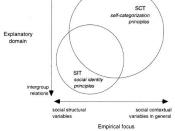Social identity is the acceptance of who we are, and reciprocally, other people's understanding of themselves. The ever changing culture we live in influences the way language develops and the way it is used by different people in society. The principles of a society is reflected in the manner in which language is used, and since children learn their words and way of speech form their parents, they ultimately learn their values, prejudices and expectations from their as well. As result, the principles of society are passed down from parent to child and ultimately passed down from generation to generation. One way in which language has shaped social identity is by teaching individuals to behave in a certain way and describe the behaviour of others in such as way that is acceptable for their sex, over time society has created gender specific roles. For example men are seen to be consistent, rational and objective whereas women are emotional, sensitive and subjective.
This stereotyping has enabled society as a whole to become male dominated and this is evident in language. Social identity is attained through socialization within social groups. By placing themselves in the role of others, people, particularly children, achieve a greater understanding of the role that they should assume. For example, a six-year-old girl playing "mommy" with her dolls will, as she gets into the role, begins to understand what a mother expects from a daughter and will, in response, be able to act upon her own role as a daughter better. Identity taking or role playing is a crucial way in which individuals creates and develops not only their social identity but also their personal identity as well. Identity is both internal and external, that is, what we think of ourselves, and external, that is, how others see...


